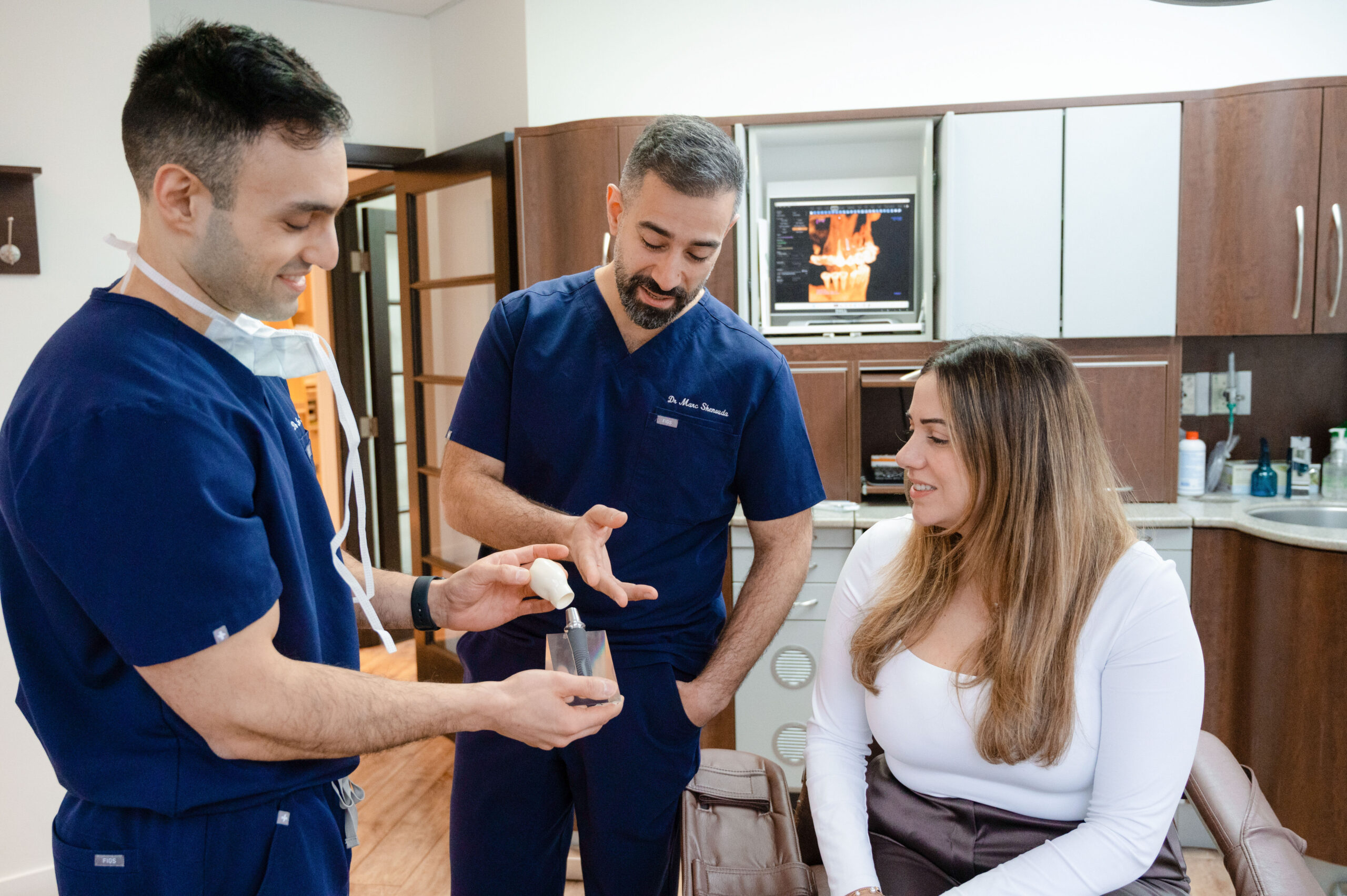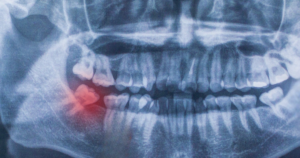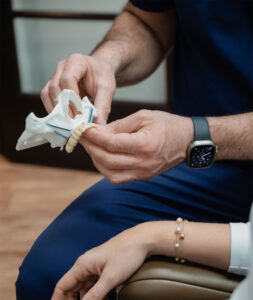Maximize the success of your dental restoration
Losing a tooth can impact your well-being and quality of life.
Fortunately, there are several options available to replace a missing tooth, including dental implants and alternative solutions such as bridges or dentures.
But which option is right for you?
In this article, we explore the benefits of dental implants and alternative treatments to help you make an informed decision.
Why Choose Dental Implants?
Excellence of a Permanent Solution
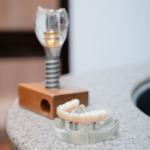
Dental implantology is an advanced treatment that offers a tooth replacement option that is both aesthetically pleasing and long-lasting.
Unlike dentures or bridges, dental implants are placed directly into the jawbone, providing optimal stability and a natural feel.
It’s the ideal choice for patients seeking a replacement option that looks, feels, and functions just like a natural tooth.
The Key Benefits of Dental Implants:
- Look and feel just like natural teeth
- Help preserve jawbone structure, minimizing bone loss
- No negative impact on surrounding teeth
- Long-lasting with a very high success rate (93% to 95%)
With the help of a qualified dental implantologist, your treatment will be personalized and tailored to your specific needs.
What about alternative solutions?
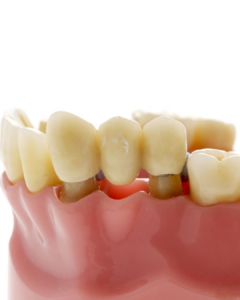

Alternatives to dental implants mainly include dental bridges and removable dentures.
While they may be more affordable in the short term, they often require more frequent maintenance and can lead to bone loss over time.
Benefits of Alternative Solutions:
- Lower initial cost
- Non-surgical procedure
- Shorter treatment time
- Less complex treatment process
Dental Implants vs. Alternatives: What’s the Difference?
Durability
Dental Implant: A permanent titanium root offering decades of functionality.
Alternatives: Require replacement or adjustment every 5 to 10 years.
Maintenance
Dental Implant: Brush and floss just like natural teeth.
Alternatives: Require special cleaning and sometimes adhesives.
Function
Dental Implant: Delivers optimal chewing power.
Alternatives: Reduced bite force and risk of shifting.
Cost Structure
Dental Implant: Higher upfront cost, but more cost-effective over time.
Alternatives: Lower initial cost, but ongoing maintenance expenses.
What Experienced Patients Are Saying
Patients who have chosen dental implants in Montreal especially appreciate the natural feel when chewing—so much so that they often forget they even have an artificial tooth.
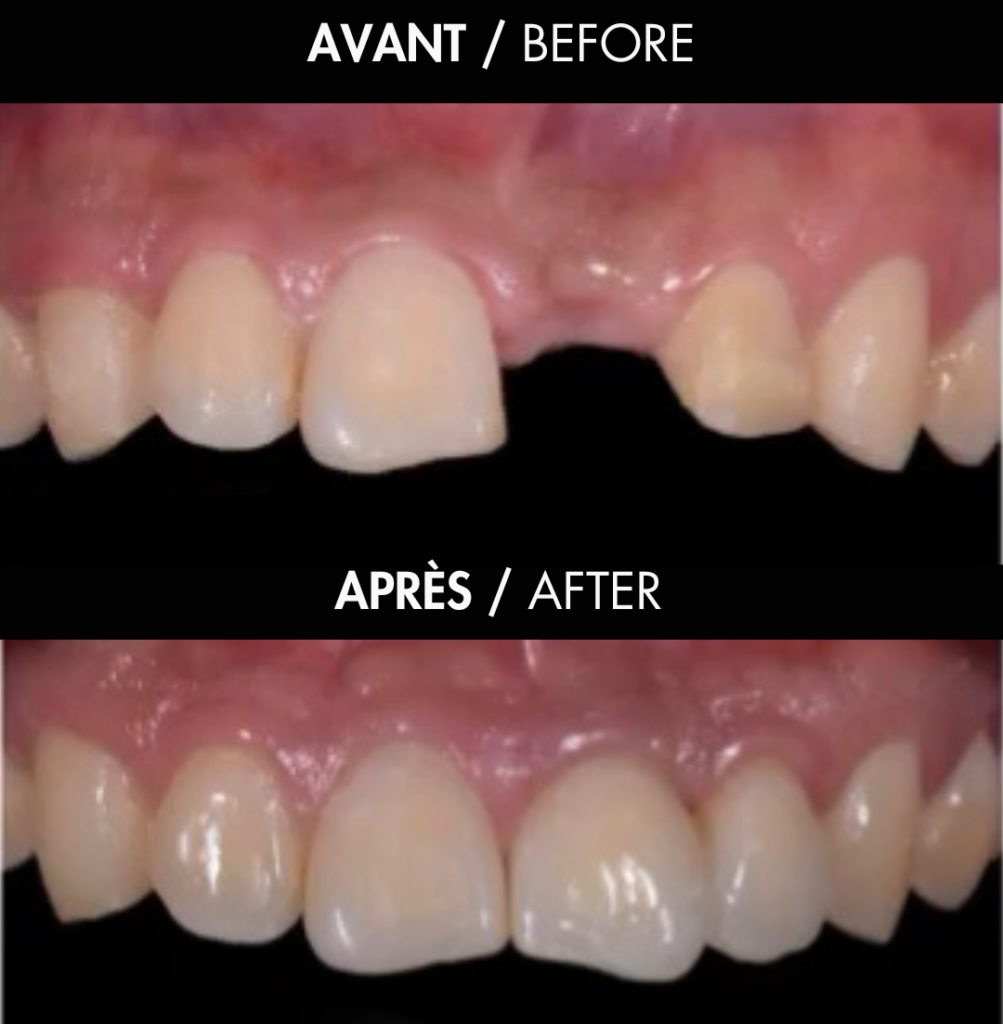
Unlike alternatives like dentures, a dental implant doesn’t need to be removed for cleaning, making daily care much simpler.
On the other hand, those who opt for alternative solutions often value their lower upfront cost, quicker treatment time, and the fact that no surgery is required.
Whether you’re looking for the best place to get a dental implant or considering other options, consulting with a dental implantologist can help you find the solution that best fits your needs and budget.
Overview of Treatment Requirements
Dental Implant Placement
Dental implant treatment involves several steps, usually spread out over a few months:
- Consultation with a dental implantologist to assess your eligibility and determine the most suitable approach for your unique situation.
- Implant surgery, during which a titanium implant is placed into the jawbone to replace the missing tooth root.
- Healing period (osseointegration), allowing the bone to fuse with the implant for optimal stability.
- Attachment of the abutment and custom crown, completing your smile with a natural-looking, long-lasting artificial tooth.
In some cases, a bone graft may be required to provide a solid foundation before placing dental implants.
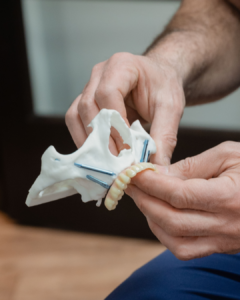
However, for patients with severe bone loss in the upper jaw who are not candidates for a graft, zygomatic implants offer an advanced alternative solution.
Unlike traditional dental implants, these longer implants are anchored directly into the zygomatic bone (cheekbone), providing a stable foundation for dental restoration without the need for bone grafting.
This option is ideal for individuals seeking reliable dental implants despite significant bone atrophy.
Immediate Dental Implant Temporization
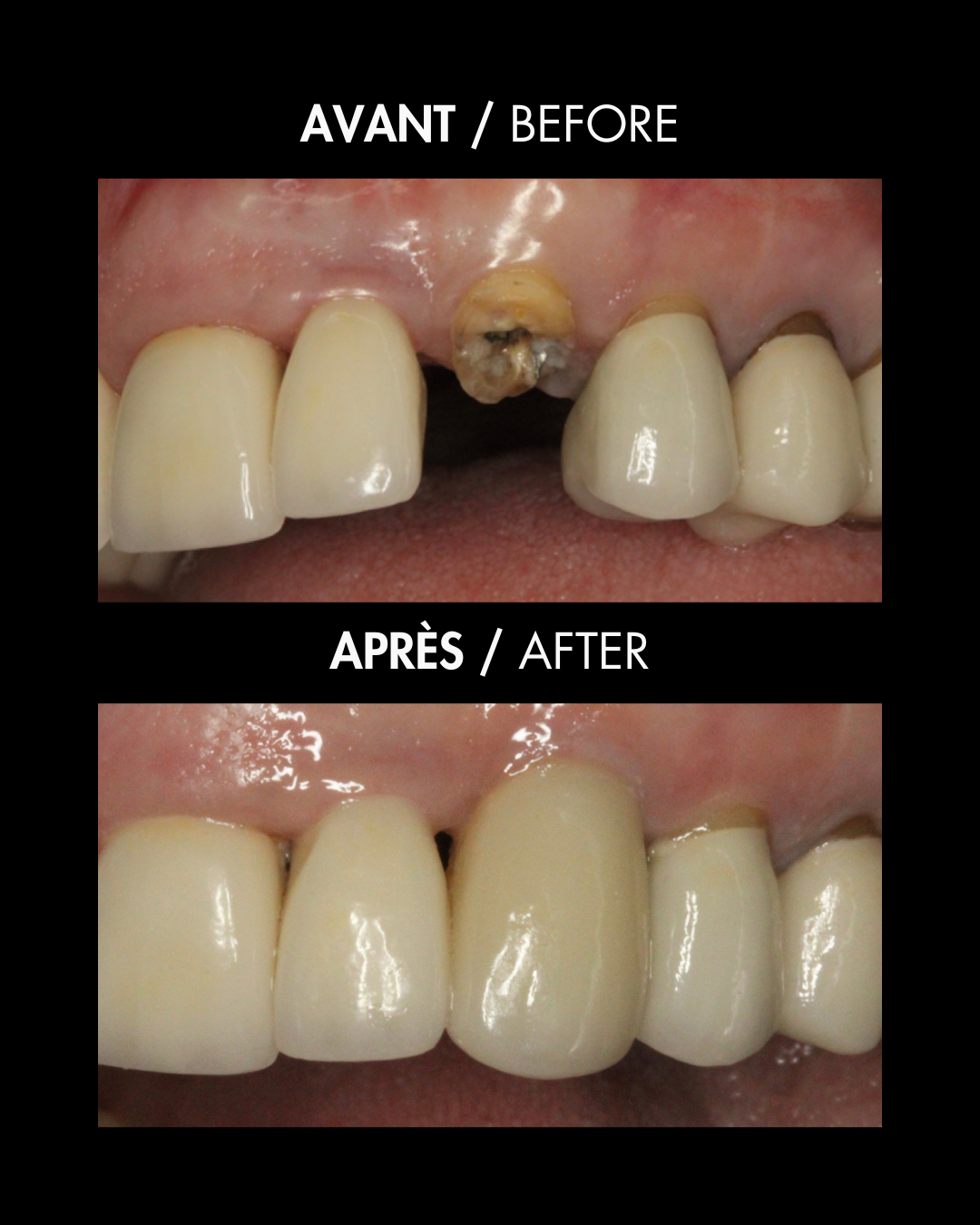
For patients looking for a faster solution, immediate dental implant temporization offers the possibility of receiving a fixed temporary tooth on the same day as the surgery.
Unlike traditional implants, which require several months of healing (osseointegration) before a crown can be placed, this advanced technique allows patients to enjoy a functional smile immediately after the procedure.
This option is especially beneficial for those who wish to reduce treatment time while still enjoying a long-lasting and aesthetically pleasing result.
Thanks to recent advances in dental implantology, treatment can now be tailored to the unique needs of each patient. Whether it’s with traditional implants, zygomatic implants, or immediate dental implant temporization, an experienced dental implantologist can recommend the best solution to help you regain a natural and functional smile.
Alternative Solutions
Alternative options to dental implants—such as removable dentures and dental bridges—involve several steps before they become fully functional.
First, dental impressions are taken to create a denture or bridge that fits precisely with the patient’s oral structure.
Once the denture is made, an adjustment period is often necessary to ensure optimal comfort and to prevent irritation or painful pressure points.
Unlike a dental implant, which integrates directly with the jawbone, these alternatives may require adjustments over time due to bone loss or changes in the dental structure.
Regular maintenance is also essential: dentures must be cleaned daily using specific products, and in some cases, adhesives are needed to improve stability.
While these options can be more affordable in the short term, they often require more upkeep and more frequent replacements than implants.
Which tooth replacement option is best for you?
Both options can effectively replace missing teeth.
If you want maximum durability and the most natural function, dental implants are the way to go.
If you prefer simpler procedures and lower initial costs, alternative solutions may be a better fit.
Choose dental implants if you’re looking for:
✔ A permanent solution that lasts for decades
✔ Preservation of jawbone and facial structure
✔ Natural look and function
Consider alternative solutions if you’re looking for:
✔ Lower upfront cost
✔ Faster treatment time
✔ Non-surgical procedures
Note: Your insurance coverage, financing options, and overall oral health should all be considered when making your decision.
Financial Considerations
The cost of dental implants in Montreal can vary depending on several factors, including:
- The number of implants needed
- The complexity of the procedure
- Whether a bone graft or zygomatic implant is required
- The type of crown used
While dental implants represent a significant investment:
- Dental insurance may cover part of the cost. It’s worth checking the coverage details of your policy.
- You may be able to claim the cost of your dental implant as an eligible medical expense on your T1 Income Tax and Benefit Return.
- Financing plans are often available.
- Long-term cost-effectiveness compared to repeated replacements.
- Your initial consultation will provide a personalized treatment plan and cost estimate.
Although dental implants in Montreal are more expensive than dentures or bridges, they are a long-term, durable investment.

Trust a Dental Implant Expert
If you’re looking for the best place to get a dental implant in Montreal, it’s important to choose a qualified dental implantologist.
Specialized clinics offer advanced technology and personalized treatment plans to ensure the success of your implants.
Keep in mind that dental implants are a long-term investment in your oral health—they help preserve your remaining teeth while providing a lasting solution for missing ones.
Book a consultation today and discover how dental implants can transform your smile!
Maximize the success of your dental restoration
Losing a tooth can impact your well-being and quality of life.
Fortunately, there are several options available to replace a missing tooth, including dental implants and alternative solutions such as bridges or dentures.
But which option is right for you?
In this article, we explore the benefits of dental implants and alternative treatments to help you make an informed decision.
Why Choose Dental Implants?
Excellence of a Permanent Solution

Dental implantology is an advanced treatment that offers a tooth replacement option that is both aesthetically pleasing and long-lasting.
Unlike dentures or bridges, dental implants are placed directly into the jawbone, providing optimal stability and a natural feel.
It’s the ideal choice for patients seeking a replacement option that looks, feels, and functions just like a natural tooth.
The Key Benefits of Dental Implants:
- Look and feel just like natural teeth
- Help preserve jawbone structure, minimizing bone loss
- No negative impact on surrounding teeth
- Long-lasting with a very high success rate (93% to 95%)
With the help of a qualified dental implantologist, your treatment will be personalized and tailored to your specific needs.
What about alternative solutions?
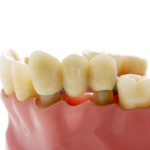

Alternatives to dental implants mainly include dental bridges and removable dentures.
While they may be more affordable in the short term, they often require more frequent maintenance and can lead to bone loss over time.
Benefits of Alternative Solutions:
- Lower initial cost
- Non-surgical procedure
- Shorter treatment time
- Less complex treatment process
Dental Implants vs. Alternatives: What’s the Difference?
Durability
Dental Implant: A permanent titanium root offering decades of functionality.
Alternatives: Require replacement or adjustment every 5 to 10 years.
Maintenance
Dental Implant: Brush and floss just like natural teeth.
Alternatives: Require special cleaning and sometimes adhesives.
Function
Dental Implant: Delivers optimal chewing power.
Alternatives: Reduced bite force and risk of shifting.
Cost Structure
Dental Implant: Higher upfront cost, but more cost-effective over time.
Alternatives: Lower initial cost, but ongoing maintenance expenses.
What Experienced Patients Are Saying
Patients who have chosen dental implants in Montreal especially appreciate the natural feel when chewing—so much so that they often forget they even have an artificial tooth.

Unlike alternatives like dentures, a dental implant doesn’t need to be removed for cleaning, making daily care much simpler.
On the other hand, those who opt for alternative solutions often value their lower upfront cost, quicker treatment time, and the fact that no surgery is required.
Whether you’re looking for the best place to get a dental implant or considering other options, consulting with a dental implantologist can help you find the solution that best fits your needs and budget.
Overview of Treatment Requirements
Dental Implant Placement
Dental implant treatment involves several steps, usually spread out over a few months:
- Consultation with a dental implantologist to assess your eligibility and determine the most suitable approach for your unique situation.
- Implant surgery, during which a titanium implant is placed into the jawbone to replace the missing tooth root.
- Healing period (osseointegration), allowing the bone to fuse with the implant for optimal stability.
- Attachment of the abutment and custom crown, completing your smile with a natural-looking, long-lasting artificial tooth.
In some cases, a bone graft may be required to provide a solid foundation before placing dental implants.

However, for patients with severe bone loss in the upper jaw who are not candidates for a graft, zygomatic implants offer an advanced alternative solution.
Unlike traditional dental implants, these longer implants are anchored directly into the zygomatic bone (cheekbone), providing a stable foundation for dental restoration without the need for bone grafting.
This option is ideal for individuals seeking reliable dental implants despite significant bone atrophy.
Immediate Dental Implant Temporization

For patients looking for a faster solution, immediate dental implant temporization offers the possibility of receiving a fixed temporary tooth on the same day as the surgery.
Unlike traditional implants, which require several months of healing (osseointegration) before a crown can be placed, this advanced technique allows patients to enjoy a functional smile immediately after the procedure.
This option is especially beneficial for those who wish to reduce treatment time while still enjoying a long-lasting and aesthetically pleasing result.
Thanks to recent advances in dental implantology, treatment can now be tailored to the unique needs of each patient. Whether it’s with traditional implants, zygomatic implants, or immediate dental implant temporization, an experienced dental implantologist can recommend the best solution to help you regain a natural and functional smile.
Alternative Solutions
Alternative options to dental implants—such as removable dentures and dental bridges—involve several steps before they become fully functional.
First, dental impressions are taken to create a denture or bridge that fits precisely with the patient’s oral structure.
Once the denture is made, an adjustment period is often necessary to ensure optimal comfort and to prevent irritation or painful pressure points.
Unlike a dental implant, which integrates directly with the jawbone, these alternatives may require adjustments over time due to bone loss or changes in the dental structure.
Regular maintenance is also essential: dentures must be cleaned daily using specific products, and in some cases, adhesives are needed to improve stability.
While these options can be more affordable in the short term, they often require more upkeep and more frequent replacements than implants.
Which tooth replacement option is best for you?
Both options can effectively replace missing teeth.
If you want maximum durability and the most natural function, dental implants are the way to go.
If you prefer simpler procedures and lower initial costs, alternative solutions may be a better fit.
Choose dental implants if you’re looking for:
✔ A permanent solution that lasts for decades
✔ Preservation of jawbone and facial structure
✔ Natural look and function
Consider alternative solutions if you’re looking for:
✔ Lower upfront cost
✔ Faster treatment time
✔ Non-surgical procedures
Note: Your insurance coverage, financing options, and overall oral health should all be considered when making your decision.
Financial Considerations
The cost of dental implants in Montreal can vary depending on several factors, including:
- The number of implants needed
- The complexity of the procedure
- Whether a bone graft or zygomatic implant is required
- The type of crown used
While dental implants represent a significant investment:
- Dental insurance may cover part of the cost. It’s worth checking the coverage details of your policy.
- You may be able to claim the cost of your dental implant as an eligible medical expense on your T1 Income Tax and Benefit Return.
- Financing plans are often available.
- Long-term cost-effectiveness compared to repeated replacements.
- Your initial consultation will provide a personalized treatment plan and cost estimate.
Although dental implants in Montreal are more expensive than dentures or bridges, they are a long-term, durable investment.

Trust a Dental Implant Expert
If you’re looking for the best place to get a dental implant in Montreal, it’s important to choose a qualified dental implantologist.
Specialized clinics offer advanced technology and personalized treatment plans to ensure the success of your implants.
Keep in mind that dental implants are a long-term investment in your oral health—they help preserve your remaining teeth while providing a lasting solution for missing ones.
Book a consultation today and discover how dental implants can transform your smile!


